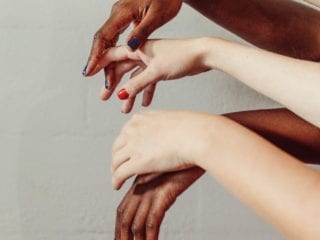The last few weeks have been heavy. I’m learning to allow myself space and grace to process my emotions.
I am angry.
I am frustrated.
I am hopeful.
I am deeply disappointed—the newest addition to my cocktail of emotions.
I am disappointed by the outrage culture that has snowballed into a mob mentality. Social media has become a weapon to critique, “check,” deprecate and tear down people in the process of learning how to advocate and speak up. In the “call out” culture, you just can’t win. When you feel like you can’t win, you withdraw, which is the last thing we need right now. We need as many voices as possible pulling up a seat to the table.
“Call out” culture says if you don’t post on social media, you are problematic.
Your silence leads to angry messages, emails and texts. You are considered “a part of the problem.” Instead, you might be taking time to grieve, to listen to the people in your world (and not on social media), to educate yourself by reading books and articles. You might just be doing the internal heart work that no one can see, which matters a lot more in the long run.
“Call out” culture says if you post on social media, you’re also problematic.
People demand that you donate money and publicly list all the ways you are taking action. People want to see “receipts” now, at the drop of a dime. If you post about supporting Black-owned businesses, then it is seen as pretense. If you post stories by Black writers, then people will say that isn’t enough.
While calling people out on social media might feel good in the moment, it is only a temporary fix—a Band-Aid for a gaping wound. It might feel like advocacy, but in reality, it only builds walls, inhibiting the possibility of renewal, redemption and true dialogue. “Call out” culture feels really good when we’re in pain, and right now, we all are.
We are at each other’s throats, mistaking clever, quick-witted, biting remarks on Instagram as advocacy. Here’s the thing about the discussion on race and the push for change—we all have a part to play. Black people in America have every right to grieve, be angry, outraged, numb, tired and frustrated. We need time to mourn, to be still.
We are at each other’s throats, mistaking clever, quick-witted, biting remarks on Instagram as advocacy.
After we mourn, the Black community has to get back up in order to keep fighting, as we have done time and time again. We have to get back up to tell our stories and to elevate each other. We have to be willing to share the pain points in our experiences (with whom and when we deem it necessary and safe) in order to enlighten people on our experiences. We have to choose to come to the table again.
Non-Black friends must come to the table too. You must listen and learn. You must educate yourselves. You must believe our stories. This will require humility. This will require being a student. This will require patience.
Real change requires work. Yet, the “call out” culture is undermining that work and causing people who want the same thing—racial justice and equality—to be at each other’s throats. Angry comments correcting and publicly chastising others are posted. Quick judgments and assumptions are made, without ever asking a question first. Yet, we wonder why people don’t speak up. How did we get here?
Although the history of Black culture has always been known to me, I understand that this isn’t everyone’s experience. This isn’t their fault. While I have had to allow myself space and grace to deal with my own pain and grief, I have also had to allow space and grace for my friends who are learning, trying and, finally, finding the courage to speak. Because that is beautiful too. We all deserve the space and grace to learn, to grow and to make mistakes as we try to navigate our way through this discussion.
We have to keep coming to the table. We have to choose to speak truth in love. We can lovingly correct people without dismissing and minimizing them. Will people get it wrong? Absolutely. Will people fumble in their attempts to advocate and speak up? 100 percent. Yet, there’s grace for all these things. We need to not tear down the people who are on the same team.
We have to choose to speak truth in love. We can lovingly correct people without dismissing and minimizing them.
Along the journey of racial equality, you may make mistakes, but your voice matters. Thank you for using it. (Feel free to ignore the angry comments in your DM’s. Don’t let people steal your joy.)
What has been your response to advocate for the Black community during this time? How can you continue to use your voice in the long term?
Image via Ali Mitton, Darling Issue No. 20











